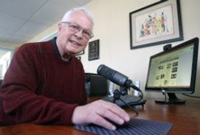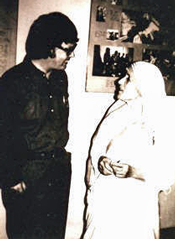 Dan Wooding & Mother Teresa
Dan Wooding & Mother Teresa Known as “God's Humanitarian Ambassador to the World,” Dr. Rex will celebrate his 88th Birthday on Wednesday, May 11, 2016.
SPRING, TX (ANS – May 9, 2016) – Dr. Lonnie Rex, who has been called “God’s Humanitarian Ambassador to the World,” is a friend who first introduced me to Mother Teresa, sent me on a reporting assignment to Nigeria, the land of my birth, where I was arrested and briefly imprisoned, and almost got me fired from my job on a London tabloid.
Lonnie, who on Wednesday, May 11th, celebrates his 88th birthday, is a quite extraordinary man. Few have achieved what God has enabled him to accomplish in his lifetime.
And it hasn’t been easy for him, especially because, as a young boy, he was stricken with Polio. His life was in the balance and he was not expected to live.
“However,” said Hugh Holmes Morgan in a story about him, “his parents’ prayers touched the heart of God to spare his life and he lived to overcome this physical challenge with his faith in God.
“Through the preaching of his father, the Rev. Dr. Robert L. Rex, Lonnie’s heart was captured by the story of the lad who willing gave his lunch to Jesus that his mother had prepared for him of five barley loaves and two small fish. Jesus blessed the loaves and fish and fed 5,000 men, notwithstanding the women and the children.
“That story became Lonnie’s burning desire to give what he had to Jesus, and became the motivating force in the extensive ministries God gave him over many years of humanitarian service around the world.
SPRING, TX (ANS – May 9, 2016) – Dr. Lonnie Rex, who has been called “God’s Humanitarian Ambassador to the World,” is a friend who first introduced me to Mother Teresa, sent me on a reporting assignment to Nigeria, the land of my birth, where I was arrested and briefly imprisoned, and almost got me fired from my job on a London tabloid.
Lonnie, who on Wednesday, May 11th, celebrates his 88th birthday, is a quite extraordinary man. Few have achieved what God has enabled him to accomplish in his lifetime.
And it hasn’t been easy for him, especially because, as a young boy, he was stricken with Polio. His life was in the balance and he was not expected to live.
“However,” said Hugh Holmes Morgan in a story about him, “his parents’ prayers touched the heart of God to spare his life and he lived to overcome this physical challenge with his faith in God.
“Through the preaching of his father, the Rev. Dr. Robert L. Rex, Lonnie’s heart was captured by the story of the lad who willing gave his lunch to Jesus that his mother had prepared for him of five barley loaves and two small fish. Jesus blessed the loaves and fish and fed 5,000 men, notwithstanding the women and the children.
“That story became Lonnie’s burning desire to give what he had to Jesus, and became the motivating force in the extensive ministries God gave him over many years of humanitarian service around the world.
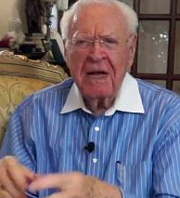 Dr. Lonnie Rex, God's Ambassador
Dr. Lonnie Rex, God's Ambassador “Lonnie never asked anything from God for himself, but prayed that God would give him ideas, concepts, and wisdom to be used to help others. He believed God could use him as He did the lad in the Gospel narrative to bless others.
“For many years he served some well-known American evangelists in their ministries through tent crusades, large auditoriums, radio and television.”
I first became acquainted with Lonnie Rex, who founded the David Livingstone Foundation with offices in Tulsa, Oklahoma, and the David Livingstone Missionary Society in Glasgow, Scotland, when in 1975, I received a phone call from him at the London-based newspaper where I was working.
Lonnie said he had heard about my journalism and wondered if I might be free to travel to India and Bangladesh to report on his work there, and then added, “I would also like you to go to Calcutta to interview Mother Teresa, who is a good friend of our work.”
I managed to get a couple of weeks off from my job, and headed off to India with a colleague of Dr. Rex, and travelled through India, and before going to Bangladesh, where he had a hospital, I went by train to Calcutta to interview the extraordinary lady who has been called “The Saint of the Gutters.”
When Mother Teresa first came into the tiny room at her Missionaries of Charity headquarters, where we were to conduct the interview, I soon realized that that although she was small in stature--she stood only 4-foot-11-inches -- she was a giant to the have-nots of life that she ministered to during her six decades on the subcontinent of India, as well as others around the world.
Her friends were the starving, the dying, and the poor.
As a then young and learning-on-the job reporter, I immediately warmed to this gentle woman who went on to win the Nobel Peace Prize, for she had seen more poverty than anyone I had ever met. Speaking in the founding, festering slum where she made her simple home, I was surprised to hear her express pity for the “poverty-stricken West.”
“The spiritual poverty of the Western World is much greater than the physical poverty of our people,” she told me, as the fan whirred above us, vainly trying to alleviate the unbearable heat of that Indian city.
Emptiness
“You, in the West, have millions of people who suffer such terrible loneliness and emptiness. They feel unloved and unwanted. These people are not hungry in the physical sense, but they are in another way. They know they need something more than money, yet they don't know what it is.
“What they are missing, really, is a living relationship with God.”
It turned out to be one of the most moving interviews I had ever conducted, but that was not the end of my relationship with Lonnie Rex, as the next assignment he sent me on turned out to be rather scary. I had been traveling around Kenya for him, when I got a message saying that he would like me to go onto Nigeria, the land of my birth, to report on a “converted witch doctor” who was said to be running an orphanage there. (Sadly, he turned out to be fake.)
As I had left Nigeria a young boy in 1942, and had never been back, I was really excited to be going “home” and, as I boarded the Ethiopian Airlines jet from Nairobi to Lagos, my mood changed as soon turned sour and quite dangerous for me at the immigration desk.
I handed my British passport to the immigration official, which happened to have “journalist” posted inside it, and he began to become angry. At that time, I hadn’t realized that Nigeria was in dispute with the UK over a former president now living in Warwick, England, who they wanted to put on trial in Nigeria, and so the man promptly told me to follow him, and open up a cell door at the airport, and pushed me inside.
I tried to protest, saying, “Why are you doing this to me? I was born in Nigeria.” But that didn’t appear to matter, as they said they didn’t want a “British journalist” snooping around their country. The cell had four Africans, who were bemused that a white man had also joined them. However, they were really kind to me, and one of them even gave up his bed to me to try and sleep on.
To make matters worse, Nigeria, at that time, was publically executing people on Lagos Beach, and airing it live in “Prime Time” on Nigerian Television. I certainly didn’t want to be featured being shot on the beach for all the viewers to see.
After a terrible night in the cell, I was called before the Chief Immigration office and informed that I was being deported back to the UK. I was then frog-marched across the tarmac, a rifle in my back, and put on a flight back to Gatwick Airport, just outside of London. My wife, Norma, was shocked when I called her from the airport and shared what had happened.
My case was raised in the British House of Commons by Bill Molloy, the Labour MP for Ealing North, who condemned my treatment, and then I called Lonnie at his Tulsa office and gave him the news of my short time in Nigeria, for which he was horrified.
“For many years he served some well-known American evangelists in their ministries through tent crusades, large auditoriums, radio and television.”
I first became acquainted with Lonnie Rex, who founded the David Livingstone Foundation with offices in Tulsa, Oklahoma, and the David Livingstone Missionary Society in Glasgow, Scotland, when in 1975, I received a phone call from him at the London-based newspaper where I was working.
Lonnie said he had heard about my journalism and wondered if I might be free to travel to India and Bangladesh to report on his work there, and then added, “I would also like you to go to Calcutta to interview Mother Teresa, who is a good friend of our work.”
I managed to get a couple of weeks off from my job, and headed off to India with a colleague of Dr. Rex, and travelled through India, and before going to Bangladesh, where he had a hospital, I went by train to Calcutta to interview the extraordinary lady who has been called “The Saint of the Gutters.”
When Mother Teresa first came into the tiny room at her Missionaries of Charity headquarters, where we were to conduct the interview, I soon realized that that although she was small in stature--she stood only 4-foot-11-inches -- she was a giant to the have-nots of life that she ministered to during her six decades on the subcontinent of India, as well as others around the world.
Her friends were the starving, the dying, and the poor.
As a then young and learning-on-the job reporter, I immediately warmed to this gentle woman who went on to win the Nobel Peace Prize, for she had seen more poverty than anyone I had ever met. Speaking in the founding, festering slum where she made her simple home, I was surprised to hear her express pity for the “poverty-stricken West.”
“The spiritual poverty of the Western World is much greater than the physical poverty of our people,” she told me, as the fan whirred above us, vainly trying to alleviate the unbearable heat of that Indian city.
Emptiness
“You, in the West, have millions of people who suffer such terrible loneliness and emptiness. They feel unloved and unwanted. These people are not hungry in the physical sense, but they are in another way. They know they need something more than money, yet they don't know what it is.
“What they are missing, really, is a living relationship with God.”
It turned out to be one of the most moving interviews I had ever conducted, but that was not the end of my relationship with Lonnie Rex, as the next assignment he sent me on turned out to be rather scary. I had been traveling around Kenya for him, when I got a message saying that he would like me to go onto Nigeria, the land of my birth, to report on a “converted witch doctor” who was said to be running an orphanage there. (Sadly, he turned out to be fake.)
As I had left Nigeria a young boy in 1942, and had never been back, I was really excited to be going “home” and, as I boarded the Ethiopian Airlines jet from Nairobi to Lagos, my mood changed as soon turned sour and quite dangerous for me at the immigration desk.
I handed my British passport to the immigration official, which happened to have “journalist” posted inside it, and he began to become angry. At that time, I hadn’t realized that Nigeria was in dispute with the UK over a former president now living in Warwick, England, who they wanted to put on trial in Nigeria, and so the man promptly told me to follow him, and open up a cell door at the airport, and pushed me inside.
I tried to protest, saying, “Why are you doing this to me? I was born in Nigeria.” But that didn’t appear to matter, as they said they didn’t want a “British journalist” snooping around their country. The cell had four Africans, who were bemused that a white man had also joined them. However, they were really kind to me, and one of them even gave up his bed to me to try and sleep on.
To make matters worse, Nigeria, at that time, was publically executing people on Lagos Beach, and airing it live in “Prime Time” on Nigerian Television. I certainly didn’t want to be featured being shot on the beach for all the viewers to see.
After a terrible night in the cell, I was called before the Chief Immigration office and informed that I was being deported back to the UK. I was then frog-marched across the tarmac, a rifle in my back, and put on a flight back to Gatwick Airport, just outside of London. My wife, Norma, was shocked when I called her from the airport and shared what had happened.
My case was raised in the British House of Commons by Bill Molloy, the Labour MP for Ealing North, who condemned my treatment, and then I called Lonnie at his Tulsa office and gave him the news of my short time in Nigeria, for which he was horrified.
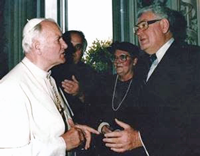 Pope John Paul & Lonnie Rex
Pope John Paul & Lonnie Rex Still, despite that setback, we remained good friends, and soon I was working for the Sunday People, a London-based tabloid, and I agree to help Lonnie with publicity work for the David Livingstone Foundation, and especially their work in Britain.
On my days off, I would fly on the London-Glasgow shuttle to work with Lonnie’s son, Royce Rex, who was heading up the UK ministry for him.
But then, a reporter from the infamous News of the World, called me and said that he had discovered my freelance activities for the David Livingston Missionary Society, and was planning to “expose” me in the next edition of the paper.
“Wooding,” he said gleefully, “I’m going to destroy you.” With that he slammed down the phone, and my heart began to race.
I decided that the only thing I could do was to go and see my news editor and tell him that I was helping the organization, as I believed in the humanitarian work they were doing. Amazingly, he told me “not to worry” as he felt this was just a vindictive action by a rival newspaper, and although the story did appear, fortunately nothing happened, and I kept my job.
So, as you can imagine, I didn’t shed any tears when, in 2006, allegations of phone hacking began to engulf the newspaper, and eventually led to its closure by Rupert Murdoch in 2012.
Lonnie Rex certainly played a huge role in my life for those years I worked with him, and he became one of my dearest friends, despite some of the adventures he got me into.
On my days off, I would fly on the London-Glasgow shuttle to work with Lonnie’s son, Royce Rex, who was heading up the UK ministry for him.
But then, a reporter from the infamous News of the World, called me and said that he had discovered my freelance activities for the David Livingston Missionary Society, and was planning to “expose” me in the next edition of the paper.
“Wooding,” he said gleefully, “I’m going to destroy you.” With that he slammed down the phone, and my heart began to race.
I decided that the only thing I could do was to go and see my news editor and tell him that I was helping the organization, as I believed in the humanitarian work they were doing. Amazingly, he told me “not to worry” as he felt this was just a vindictive action by a rival newspaper, and although the story did appear, fortunately nothing happened, and I kept my job.
So, as you can imagine, I didn’t shed any tears when, in 2006, allegations of phone hacking began to engulf the newspaper, and eventually led to its closure by Rupert Murdoch in 2012.
Lonnie Rex certainly played a huge role in my life for those years I worked with him, and he became one of my dearest friends, despite some of the adventures he got me into.
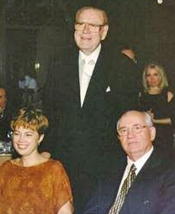 Lonnie Rex & Mikhail Gorbachev
Lonnie Rex & Mikhail Gorbachev He has served on the board of Universities, has been involved in worldwide peace talks. He has received numerous awards from Governors, Presidents, Heads of State as well as being Knighted 1993. He is the recipient of the Merit award called the Moran Medal Republic of Korea, Humanitarian award from Senator Hugh Scott US Senate 1983, Service to Mankind award International. He has also been honored by the Congress, Spain 1987, as well as the International Lions Club award, UN award, Medal General. Ground USSR 1990 and the World Humanitarian Leadership award by Mayor of Tulsa, Oklahoma.
Lonnie once said, “It has been my passion to raise money to feed those who do not have the strength to cry. That is what drives me day and night.” It still does!
Thanks Lonnie for all these years of excitement. Around you, there has never been a dull moment.
To check out Lonnie’s autobiography, My Amazing Adventures with God: From Polio and Paralysis to Walking with the Pope, please go to: http://www.lonnierex.com/BOOKSTORE.html.
You can see a video of part of Lonnie Rex’s life at https://www.youtube.com/watch?v=t2n-4oxwQIg, and if you would like to send Lonnie Rex a birthday greeting, his e-mail address is: [email protected] and his website is: http://www.lonnierex.com.
Photo captions: 1) Dan Wooding with Mother Teresa in Calcutta. 2) Lonnie Rex telling his story on video. 3) Dan in his Lagos prison cell with one of his African cell-mates. (Photo was smuggled out of Nigeria.) 4) Lonnie Rex and his wife, Betty, meeting with Pope John Paul II at the Vatican. 5) Lonnie Rex with Mikhail Gorbachev, and his wife, Raisa, in Moscow. 6) Dan Wooding recording one of his radio shows.
Lonnie once said, “It has been my passion to raise money to feed those who do not have the strength to cry. That is what drives me day and night.” It still does!
Thanks Lonnie for all these years of excitement. Around you, there has never been a dull moment.
To check out Lonnie’s autobiography, My Amazing Adventures with God: From Polio and Paralysis to Walking with the Pope, please go to: http://www.lonnierex.com/BOOKSTORE.html.
You can see a video of part of Lonnie Rex’s life at https://www.youtube.com/watch?v=t2n-4oxwQIg, and if you would like to send Lonnie Rex a birthday greeting, his e-mail address is: [email protected] and his website is: http://www.lonnierex.com.
Photo captions: 1) Dan Wooding with Mother Teresa in Calcutta. 2) Lonnie Rex telling his story on video. 3) Dan in his Lagos prison cell with one of his African cell-mates. (Photo was smuggled out of Nigeria.) 4) Lonnie Rex and his wife, Betty, meeting with Pope John Paul II at the Vatican. 5) Lonnie Rex with Mikhail Gorbachev, and his wife, Raisa, in Moscow. 6) Dan Wooding recording one of his radio shows.
| About the writer: Dan Wooding, 75, is an award-winning winning author, broadcaster and journalist who was born in Nigeria of British missionary parents, and is now living in Southern California with his wife Norma, to whom he has been married for nearly 53 years. They have two sons, Andrew and Peter, and six grandchildren who all live in the UK. Dan is the founder and international director of the ASSIST News Service (ANS), has worked for two of Great Britain’s newspapers, been a BBC Radio interview, and is the author or co-author of some 45 books. Dan has a radio show and two TV shows, all based in Southern California. *** You may republish this or any of our ANS stories with attribution to the ASSIST News Service (www.assistnews.net). |

